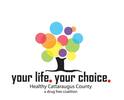National Drug and Alcohol Facts Week
The purpose of National Drug and Alcohol Facts Week is to provide education and information about drugs and alcohol. HCC reached out to students in Cattaraugus County to send us the questions that they had pertaining to alcohol and other drugs. Check out the Q & A below!
Q: Are some drugs safe?A: There is no such thing as a safe illegal drug. Over-the - counter medicines are safe as long as they are being taken as directed on the package. Prescription medications that are prescribed to YOU are safe as long as they are taken as directed by your doctor.
Q: How badly do drugs and alcohol effect your health?
A: Drugs and alcohol can have a negative impact on all of your body organs. Drugs and alcohol also put people at greater risk for diseases such as HIV and Hepatitis B and C. Regular drug use will shorten your life.
Q: How many people die of an overdose each year?
A: In 2021, the CDC estimated that there were 100,306 overdose deaths in the United States. Since the 1990’s, overdose deaths have tripled. An estimated 100 people per day die of an overdose in the United States.
Q: What is the most powerful drug?A: All drugs can be powerful and even cause death. They can be mixed with other dangerous chemicals or other drugs that make them stronger and/or deadlier such as with drugs laced with fentanyl. Over-the-counter and prescription medicines can be just as powerful if not taken as directed or if someone takes a medicine that isn’t prescribed to them.
Q: What is the main reason people do drugs?
A: People may use drugs as a way to cope with a bad situation or as a way to escape from problems. Peer pressure is another reason people use drugs.
|
Q: Can you die from drinking too much?
A: If someone drinks too much in a short amount of time they run the risk of overdose which can cause a coma and even death. Alcohol poisoning impacts breathing, heart rate, body temperature, and gag reflex. It is also important to know that alcohol content is different based on the drink and amount consumed.
Q: Is marijuana better than nicotine and has anyone died from smoking it?
A: Both marijuana and nicotine are addictive. Your brain is not fully developed until around the age of 25. Nicotine and marijuana use can have a lasting impact on your brain. In fact, youth who regularly use marijuana can lose up to 8 IQ points. Marijuana that is unregulated can have other drugs in it which could cause death. Both marijuana and nicotine are illegal for anyone under the age of 21.
Q: Why do people still continue to take drugs or drink alcohol when they know it’s bad for them?
A: There are several reasons why people continue to abuse drugs even when they know it is bad for them. Some people suffer from a substance use disorder (chemical dependency). Others continue to use as a way to cope or escape from a difficult or painful situation. Seeking pleasure or immediate gratification is also another reason.
Q: What do you do if you are getting peer pressured into doing drugs or drinking alcohol?
A: If you are able, steer away from the situation or conversation such as excusing yourself or changing the subject. Say that you can’t because you have a “big game” or really difficult test coming up that you want to be at your best for. Have a “way out” such as using a code word with your parents that you can call or text so that they will come get you or say that you are needed at home. Find a trusted adult and ask for help to get out of the situation.
|
